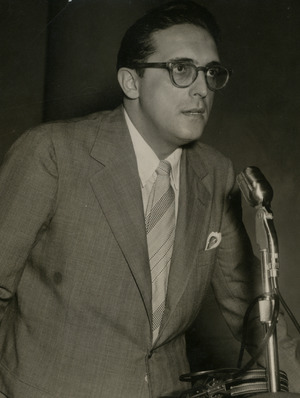Carlos Lacerda facts for kids
Quick facts for kids
Carlos Lacerda
|
|
|---|---|

Lacerda in 1954
|
|
| Governor of Guanabara | |
| In office 5 December 1960 – 11 October 1965 |
|
| Vice Governor | None (1960–1963) Eloy Dutra (1963–1964) Raphael Magalhães (1964–1965) |
| Preceded by | José Sette Câmara |
| Succeeded by | Raphael Magalhães |
| Parliamentary offices | |
| 1960–1960 | Federal Deputy for the Federal District |
| 1958–1959 | Federal Deputy for the Federal District |
| 1955–1958 | Federal Deputy for the Federal District |
| 1947–1948 | City Councillor of the Federal District |
| Personal details | |
| Born |
Carlos Frederico Werneck de Lacerda
30 April 1914 Vassouras, Rio de Janeiro, Brazil |
| Died | 21 May 1977 (aged 63) Rio de Janeiro, Rio de Janeiro, Brazil |
| Political party | UDN (1945–1965) |
| Alma mater | National Faculty of Law |
| Occupation | Journalist (Columnist of Correio da Manhã) Publisher (Owner of Tribuna da Imprensa and Nova Fronteira) |
Carlos Frederico Werneck de Lacerda (born April 30, 1914 – died May 21, 1977) was a Brazilian journalist and politician. He was known for his strong opinions and his important role in Brazilian politics during the mid-20th century.
Contents
Carlos Lacerda's Life and Career
Early Life and Journalism
Carlos Lacerda was born in Rio de Janeiro, Brazil. His family was well-known in politics from the city of Vassouras. His father, Maurício de Lacerda, was also a politician and writer.
When he was a law student, Lacerda was interested in left-wing ideas. However, by the 1940s, his views changed. He became a strong opponent of communism and a conservative thinker.
Lacerda began his career in journalism in 1929. He worked for a newspaper called Diário de Notícias. Later, in 1949, he started his own newspaper, Tribuna da Imprensa.
Political Beginnings
Lacerda started his political journey in 1947. He was elected to the city council of Rio de Janeiro. This meant he helped make decisions for the city.
In 1950, he was elected as a National Democratic Union representative. He became a Federal Deputy in the Chamber of Deputies. This is like being a member of parliament for the whole country.
Lacerda became very famous for strongly disagreeing with President Getúlio Vargas. He even called for Vargas to be removed from power.
Key Political Events
In August 1954, Lacerda survived an attempt on his life. During this event, a military officer named Major Rubens Vaz was killed. Lacerda was only slightly hurt.
Later in 1954, Lacerda was re-elected as a Federal Deputy. He received more votes than any other candidate. He also opposed the government of President Juscelino Kubitschek.
Governor of Guanabara
In 1960, Lacerda was elected governor of Guanabara State. This state included the city of Rio de Janeiro. As governor, he worked to solve big problems in Rio. These included improving water services, public transportation, and housing.
During his time as governor, some areas of the city were cleared. This meant that many people had to move from their homes.
Later Political Life
Lacerda was a very opinionated and sometimes controversial politician. He was involved in the political changes that led to President Jânio Quadros resigning in 1961. He also worked against the presidency of João Goulart.
He hoped to become president in the 1965 elections. Lacerda first supported the military takeover (coup d'état) in 1964. He was even nominated as a candidate by his party. However, the military decided not to hold elections in 1965. Lacerda then lost the support of the military government.
In 1968, Lacerda tried to bring back democracy to Brazil. He even worked with his old political rivals, Kubitschek and Goulart. Because of this, Lacerda was arrested for a short time. He also lost his right to run for political office for ten years.
After this, he left politics. He went back to his work as a journalist and publisher. Carlos Lacerda died suddenly in Rio de Janeiro in 1977 from a heart attack.
In Popular Culture
Carlos Lacerda has been shown in movies:
- He was played by actor Alexandre Borges in the 2014 film Getúlio.
- His friendship with architect Lota de Macedo Soares is shown in the 2013 film Reaching for the Moon. Actor Marcello Airoldi played Lacerda in this movie.
- He is also mentioned in the book "Child of the Dark," which is the diary of Carolina Maria de Jesus.
See also
 In Spanish: Carlos Lacerda para niños
In Spanish: Carlos Lacerda para niños
 | William L. Dawson |
 | W. E. B. Du Bois |
 | Harry Belafonte |

